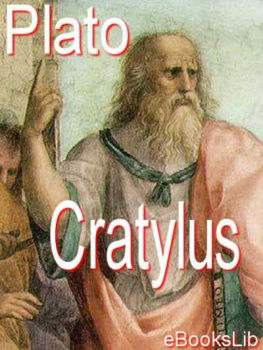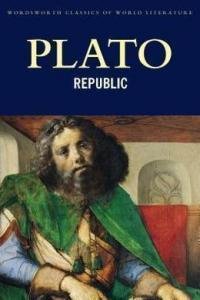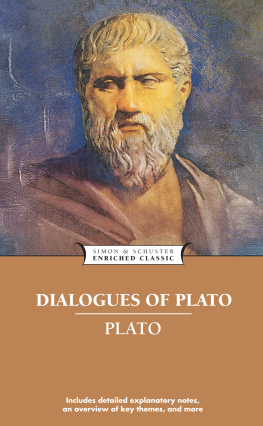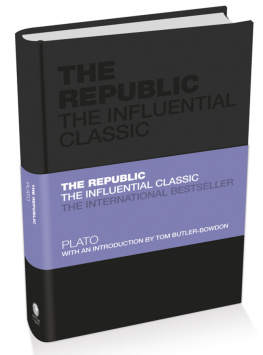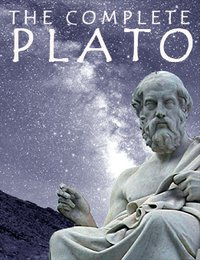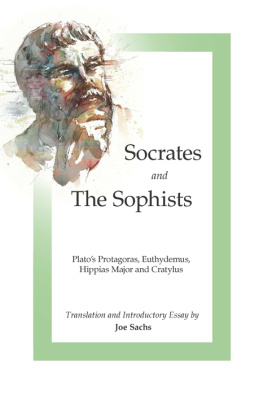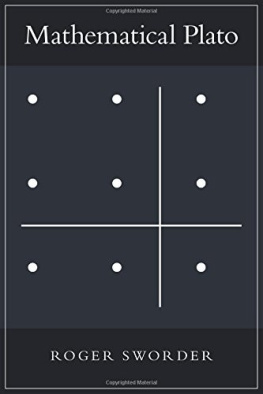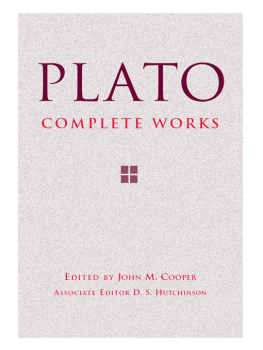Platon - Cratylus
Here you can read online Platon - Cratylus full text of the book (entire story) in english for free. Download pdf and epub, get meaning, cover and reviews about this ebook. year: 2001, publisher: eBooksLib, genre: Science. Description of the work, (preface) as well as reviews are available. Best literature library LitArk.com created for fans of good reading and offers a wide selection of genres:
Romance novel
Science fiction
Adventure
Detective
Science
History
Home and family
Prose
Art
Politics
Computer
Non-fiction
Religion
Business
Children
Humor
Choose a favorite category and find really read worthwhile books. Enjoy immersion in the world of imagination, feel the emotions of the characters or learn something new for yourself, make an fascinating discovery.
Cratylus: summary, description and annotation
We offer to read an annotation, description, summary or preface (depends on what the author of the book "Cratylus" wrote himself). If you haven't found the necessary information about the book — write in the comments, we will try to find it.
Cratylus — read online for free the complete book (whole text) full work
Below is the text of the book, divided by pages. System saving the place of the last page read, allows you to conveniently read the book "Cratylus" online for free, without having to search again every time where you left off. Put a bookmark, and you can go to the page where you finished reading at any time.
Font size:
Interval:
Bookmark:
It was converted from clean and standard xhtml/xml files.
It uses metatags to identify content, and other data.
The available resources specific to each ebook format were used togive the reader a pleasant reading experience.
More details available at the ebookslib.com website.
Any suggestions that help us improve these editions arewelcome.
2011 ebookslib.com
eBook Version
eBooksLib.com
eBooksLib, eBooksLib.com are Registered trademarks owned byeBooksDistrib S.A.R.L (LLC)
___________________
November-2011
ISBN : 978-1-4121-6938-7
C RATYLUS
by Plato
Translated by Benjamin Jowett

T he Cratylus hasalways been a source of perplexity to the student of Plato. Whilein fancy and humour, and perfection of style and metaphysicaloriginality, this dialogue may be ranked with the best of thePlatonic writings, there has been an uncertainty about the motiveof the piece, which interpreters have hitherto not succeeded indispelling. We need not suppose that Plato used words in order toconceal his thoughts, or that he would have been unintelligible toan educated contemporary. In the Phaedrus and Euthydemus we alsofind a difficulty in determining the precise aim of the author.Plato wrote satires in the form of dialogues, and his meaning, likethat of other satirical writers, has often slept in the ear ofposterity. Two causes may be assigned for this obscurity: 1st, thesubtlety and allusiveness of this species of composition; 2nd, thedifficulty of reproducing a state of life and literature which haspassed away. A satire is unmeaning unless we can place ourselvesback among the persons and thoughts of the age in which it waswritten. Had the treatise of Antisthenes upon words, or thespeculations of Cratylus, or some other Heracleitean of the fourthcentury B.C., on the nature of language been preserved to us; or ifwe had lived at the time, and been 'rich enough to attend thefifty-drachma course of Prodicus,' we should have understood Platobetter, and many points which are now attributed to theextravagance of Socrates' humour would have been found, like theallusions of Aristophanes in the Clouds, to have gone home to thesophists and grammarians of the day.
For the age was very busy with philologicalspeculation; and many questions were beginning to be asked aboutlanguage which were parallel to other questions about justice,virtue, knowledge, and were illustrated in a similar manner by theanalogy of the arts. Was there a correctness in words, and werethey given by nature or convention? In the presocratic philosophymankind had been striving to attain an expression of their ideas,and now they were beginning to ask themselves whether theexpression might not be distinguished from the idea? They were alsoseeking to distinguish the parts of speech and to enquire into therelation of subject and predicate. Grammar and logic were movingabout somewhere in the depths of the human soul, but they were notyet awakened into consciousness and had not found names forthemselves, or terms by which they might be expressed. Of thesebeginnings of the study of language we know little, and therenecessarily arises an obscurity when the surroundings of such awork as the Cratylus are taken away. Moreover, in this, as in mostof the dialogues of Plato, allowance has to be made for thecharacter of Socrates. For the theory of language can only bepropounded by him in a manner which is consistent with his ownprofession of ignorance. Hence his ridicule of the new school ofetymology is interspersed with many declarations 'that he knowsnothing,' 'that he has learned from Euthyphro,' and the like. Eventhe truest things which he says are depreciated by himself. Heprofesses to be guessing, but the guesses of Plato are better thanall the other theories of the ancients respecting language puttogether.
The dialogue hardly derives any light from Plato'sother writings, and still less from Scholiasts and Neoplatonistwriters. Socrates must be interpreted from himself, and on firstreading we certainly have a difficulty in understanding his drift,or his relation to the two other interlocutors in the dialogue.Does he agree with Cratylus or with Hermogenes, and is he seriousin those fanciful etymologies, extending over more than half thedialogue, which he seems so greatly to relish? Or is he serious inpart only; and can we separate his jest from his earnest? - Suntbona, sunt quaedum mediocria, sunt mala plura. Most of them areridiculously bad, and yet among them are found, as if by accident,principles of philology which are unsurpassed in any ancientwriter, and even in advance of any philologer of the last century.May we suppose that Plato, like Lucian, has been amusing his fancyby writing a comedy in the form of a prose dialogue? And what isthe final result of the enquiry? Is Plato an upholder of theconventional theory of language, which he acknowledges to beimperfect? or does he mean to imply that a perfect language canonly be based on his own theory of ideas? Or if this latterexplanation is refuted by his silence, then in what relation doeshis account of language stand to the rest of his philosophy? Or maywe be so bold as to deny the connexion between them? (For theallusion to the ideas at the end of the dialogue is merely intendedto show that we must not put words in the place of things orrealities, which is a thesis strongly insisted on by Plato in manyother passages)...These are some of the first thoughts which arisein the mind of the reader of the Cratylus. And the consideration ofthem may form a convenient introduction to the general subject ofthe dialogue.
We must not expect all the parts of a dialogue ofPlato to tend equally to some clearly-defined end. His idea ofliterary art is not the absolute proportion of the whole, such aswe appear to find in a Greek temple or statue; nor should his worksbe tried by any such standard. They have often the beauty ofpoetry, but they have also the freedom of conversation. 'Words aremore plastic than wax' (Rep.), and may be moulded into any form. Hewanders on from one topic to another, careless of the unity of hiswork, not fearing any 'judge, or spectator, who may recall him tothe point' (Theat.), 'whither the argument blows we follow' (Rep.).To have determined beforehand, as in a modern didactic treatise,the nature and limits of the subject, would have been fatal to thespirit of enquiry or discovery, which is the soul of thedialogue...These remarks are applicable to nearly all the works ofPlato, but to the Cratylus and Phaedrus more than any others. SeePhaedrus, Introduction.
There is another aspect under which some of thedialogues of Plato may be more truly viewed: - they are dramaticsketches of an argument. We have found that in the Lysis,Charmides, Laches, Protagoras, Meno, we arrived at no conclusion -the different sides of the argument were personified in thedifferent speakers; but the victory was not distinctly attributedto any of them, nor the truth wholly the property of any. And inthe Cratylus we have no reason to assume that Socrates is eitherwholly right or wholly wrong, or that Plato, though he evidentlyinclines to him, had any other aim than that of personifying, inthe characters of Hermogenes, Socrates, and Cratylus, the threetheories of language which are respectively maintained by them.
The two subordinate persons of the dialogue,Hermogenes and Cratylus, are at the opposite poles of the argument.But after a while the disciple of the Sophist and the follower ofHeracleitus are found to be not so far removed from one another asat first sight appeared; and both show an inclination to accept thethird view which Socrates interposes between them. First,Hermogenes, the poor brother of the rich Callias, expounds thedoctrine that names are conventional; like the names of slaves,they may be given and altered at pleasure. This is one of thoseprinciples which, whether applied to society or language, explainseverything and nothing. For in all things there is an element ofconvention; but the admission of this does not help us tounderstand the rational ground or basis in human nature on whichthe convention proceeds. Socrates first of all intimates toHermogenes that his view of language is only a part of asophistical whole, and ultimately tends to abolish the distinctionbetween truth and falsehood. Hermogenes is very ready to throwaside the sophistical tenet, and listens with a sort of halfadmiration, half belief, to the speculations of Socrates.
Font size:
Interval:
Bookmark:
Similar books «Cratylus»
Look at similar books to Cratylus. We have selected literature similar in name and meaning in the hope of providing readers with more options to find new, interesting, not yet read works.
Discussion, reviews of the book Cratylus and just readers' own opinions. Leave your comments, write what you think about the work, its meaning or the main characters. Specify what exactly you liked and what you didn't like, and why you think so.

